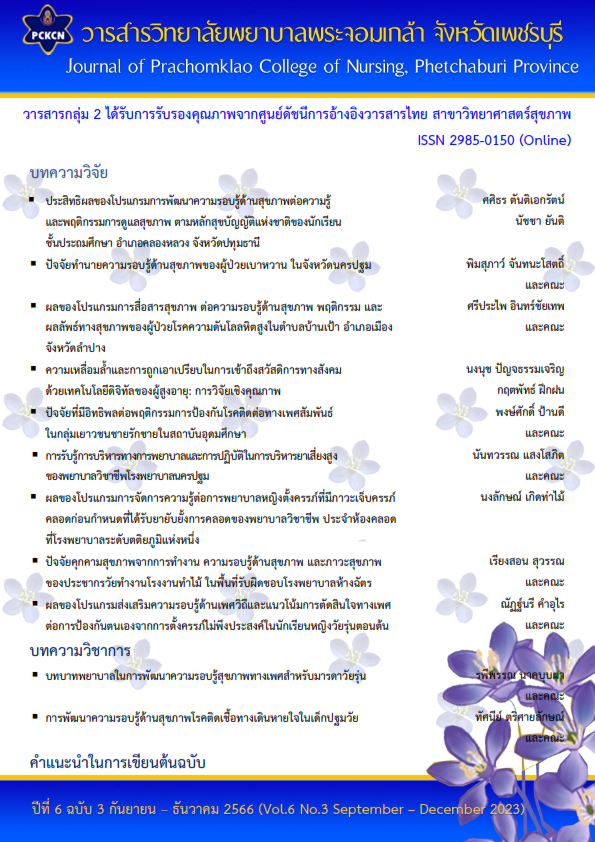ผลของโปรแกรมส่งเสริมความรอบรู้ด้านเพศวิถีและแนวโน้มการตัดสินใจทางเพศ ต่อการป้องกันตนเองจากการตั้งครรภ์ไม่พึงประสงค์ในนักเรียนหญิงวัยรุ่นตอนต้น
Main Article Content
บทคัดย่อ
การวิจัยกึ่งทดลองแบบสองกลุ่มวัดก่อนและหลังการทดลอง มีวัตถุประสงค์เพื่อศึกษาผลของโปรแกรมส่งเสริมความรอบรู้ด้านเพศวิถีศึกษาและแนวโน้มการตัดสินใจทางเพศ กลุ่มตัวอย่างเป็นนักเรียนหญิงมัธยมศึกษาปีที่ 2-3 อายุ 12-14 ปี โรงเรียนเทศบาล อ.เมือง จ.สระบุรี จำนวน 124 คน แบ่งเป็นกลุ่มทดลอง 62 คน และกลุ่มควบคุม 62 คน โดยกลุ่มควบคุมได้รับการเรียนการสอนเพศศึกษาตามปกติ กลุ่มทดลองได้รับโปรแกรมส่งเสริมความรอบรู้ด้านเพศวิถีและแนวโน้มการตัดสินใจทางเพศ เป็นระยะเวลา 2 วัน เครื่องมือที่ใช้ในการเก็บรวบรวมข้อมูลประกอบด้วยแบบสอบถามความรอบรู้ด้านเพศวิถีศึกษาและแนวโน้มการตัดสินใจทางเพศต่อการป้องกันตนเองจากการตั้งครรภ์ไม่พึงประสงค์ สัปดาห์ ผ่านการตรวจสอบความตรงตามเนื้อหาจากผู้ทรงคุณวุฒิ จำนวน 3 ท่าน ค่าความเชื่อมั่น .75 วิเคราะห์ข้อมูลด้วยร้อยละ ค่าเฉลี่ย ส่วนเบี่ยงเบนมาตรฐาน และสถิติการทดสอบที
ผลการวิจัย พบว่า หลังได้รับโปรแกรมส่งเสริมความรอบรู้ด้านเพศวิถีศึกษาและแนวโน้มการตัดสินใจทางเพศ คะแนนเฉลี่ยความรอบรู้ด้านเพศวิถีและแนวโน้มการตัดสินใจทางเพศต่อการป้องกันตนเองจากการตั้งครรภ์ไม่พึงประสงค์แตกต่างกันอย่างมีนัยสำคัญทางสถิติระหว่างกลุ่มทดลองและกลุ่มควบคุม (p <. 01, p < .05) และภายในกลุ่มทดลองก่อนและหลังเข้าร่วมโปรแกรม (p < .01, p < .05) ผลการวิจัยสามารถนำไปเป็นแนวทางส่งเสริมความรอบรู้ด้านเพศวิถี เพื่อการตัดสินใจทางเพศและป้องกันตนเองจากการตั้งครรภ์ไม่พึงประสงค์ได้
Downloads
Article Details

อนุญาตภายใต้เงื่อนไข Creative Commons Attribution-NonCommercial-NoDerivatives 4.0 International License.
เนื้อหาและข้อมูลที่เผยแพร่ในวารสารวิทยาลัยพยาบาลพระจอมเกล้า จังหวัดเพชรบุรี ถือเป็นข้อคิดเห็นและความรับผิดชอบของผู้นิพนธ์บทความโดยตรง บทความ เนื้อหา ข้อมูล รูปภาพ ฯลฯ ที่ได้รับการเผยแพร่ในวารสารนี้ ถือเป็นลิขสิทธิ์ของวารสารฯ หากบุคคลหรือหน่วยงานใดต้องการนำทั้งหมดหรือส่วนหนึ่งส่วนใดไปเผยแพร่หรือเพื่อกระทำการใด ๆ จะต้องอ้างอิงวิทยาลัยพยาบาลพระจอมเกล้า จังหวัดเพชรบุรี ทุกครั้ง
เอกสารอ้างอิง
Adultrakul, A., Potjanamart, C., & SawangJaiThum, K. (2015). Effects of problem based learning towards knowledge on sex education and opinions on sex risk behaviors among mutthayomsuksa students. Nursing Journal, 42(Special), 46-56. (in Thai)
Bandura, A. (1997) Self-efficacy: Toward a unifying theory of behavioral change. Psychological Review, 84(2), 191-215. https://org/doi/10.1037/0033-295X.84.2.191
Banluesak, J. (2016). Sex education learning management using information motivation and behavioral skill model to enhance life skills in decision making and problem solving of grade 6 students in Chulalongkorn University Demonstration Elementary School. Journal of Education Studies, 44(2), 33-56. (in Thai)
Bureau of Reproductive Health. (2022). Reproductive health situation in adolescents and youth 2022. https://rh.anamai.moph.go.th/th (in Thai)
Department of Health, (2022). Live birth rate for women aged 10-14 years. DOH dashboard. https://dashboard.anamai.moph.go.th/dashboard/labor1014n?year=2022 (in Thai)
Edwards, M., Wood, F., Davies, M., & Edwards, A. (2012). The development of health literacy in patients with a long-term health condition: The health literacy pathway model. BMC Public Health, 12(1), Article 130. http://www.biomedcentral.com/1471-2458/12/130
Health Education Division. (2019). Health education program to enhance health literacy for preventing unplanned pregnancy for middle school students. http://hed.go.th/linkHed/395 (in Thai)
Kilfoyle, K. A., Vitko, M., O'Conor, R., & Bailey, S. C. (2016). Health literacy and women's reproductive health: A systematic review. Journal of Women's Health, 25(12), 1237-1255. https://doi.org/10.1089/jwh.2016.5810
Paknoi, J., Krungkripetch, N., & Homsin, P. (2017). Effects of life skills enhancement program on perceived self-efficacy and outcome expectancy to avoid sexual risk behaviors among female lower secondary school student. Journal of Nursing and Health Care, 35(3), 58-68. (in Thai)
Phommin, P., Wattanaburanon, A., & Isarankura Na Ayudaya, W. (2022). Effects of learning activities on sexuality education using life skills for preventing premature pregnancy of junior high school students. Dhammathas Academic Journal, 22(4), 49-62. (in Thai)
Promma, N. (2021). Perceived self-efficacy of unwanted pregnancy prevention among students in a university. Journal of Health Science, 30(1), 5-13. (in Thai)
Pusuwan, S., Wongyai, K., Leekuan. (2013). Effects of skill development for prevention of sexual risk behavior on perceived self-efficacy and sexual risk behavior among female adolescent. Nursing Journal, 40(4), 68-79. (in Thai)
Sombud, S. (n.d.). Sexuality education literacy and life skills among teenagers aged 10-19 years. https://rh.anamai.moph.go.th/th/news-anamai/download/?did=211675&id=98256&reload= (in Thai)
Srijaiwong, S., Sindthu, S., Ratinthorn, A., & Viwatwonghasem, C. (2019). Sexuality education and teachers' attitudes towards sexual double standard influencing on sexual risk behaviors among adolescents. Boromarajonani College of Nursing, Uttaradit Journal, 11(2), 91-102. (in Thai)
Prevention and Solution of the Adolescent Pregnancy Problem Act B.E 2549. (2016, 31 March). Thai Government Gazette. Vol 133 Part 30 A. Page 1-14. (in Thai)
Thaphaeng, K., Panyasai, W., & Rojananit, S. (2021). The guidelines of sexuality education management for opportunity expansion school under Phitsanulok Primary Educational Service Area Office 3. Journal of Roi Kaensarn Academi, 6(8), 26-41. (in Thai)
World Health Organization. (2016). The mandate for health literacy.


